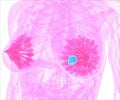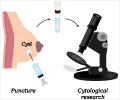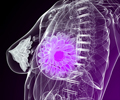Breakthrough in triple-negative breast cancer diagnosis: New test improves early detection, offering better outcomes and personalized treatment options for patients.

Researchers Develop Mechanism that Predicts Severity of Aggressive Form of Breast Cancer
Go to source).
Triple Negative Breast Cancer
Triple-negative breast cancer (TNBC) is a particularly aggressive type of breast cancer that lacks receptors for estrogen, progesterone, and the HER2 protein. This absence of receptors makes it difficult to treat with hormone therapy or targeted therapies commonly used for other types of breast cancer. TNBC often grows and spreads rapidly, making it a challenging disease to manage. While advancements have been made in recent years, there is still a need for more effective treatments and improved understanding of its biology.‘Brace yourselves, #breastcancer warriors! A major breakthrough is on the horizon. A new method improves the prediction of triple-negative breast cancer. #womencancer ’





There are no reliable methods to predict the recurrence of TNBC, a rare type of breast cancer, after treatments like chemotherapy and surgery. The study, published in the journal JCO Precision Oncology, described a new mechanism that can predict TNBC's aggressiveness with accuracy. The researchers developed a patient-derived xenograft (PDX) model to assess the growth of someone’s tumour by placing it in a mouse, to assess the aggressiveness of TNBC. The mechanism was more accurate than existing methods in predicting recurrence, allowing for an early and accurate assessment of the cancer's aggressiveness.
The research could have a direct impact on patient care and create more personalised treatment plans for patients with recurrent TNBC.
Cindy Matsen, co-author of the study and head of Breast and Gynecologic Disease Center at Huntsman Cancer Institute, said that the study has the potential to help create more customised treatment plans for individuals with recurrent triple-negative breast cancer.
The practical benefits include testing specific drugs on PDX models and providing valuable insights for physicians in treatment decisions.
Advertisement
Reference:
- Researchers Develop Mechanism that Predicts Severity of Aggressive Form of Breast Cancer - (https://healthcare.utah.edu/huntsmancancerinstitute/press-releases/2024/09/researchers-develop-mechanism-predicts-severity-of-aggressive-form-of-breast)
Source-IANS















